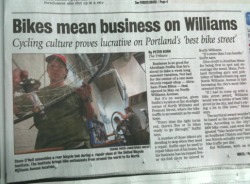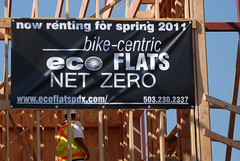
Few anti-bike ideas are as stubborn as the age-old cries of “Bikes are bad for business!” In Portland, when our bikeway network was gaining steam in the 1990s, PBOT faced battle after battle when they tried to stripe bike lanes on streets adjacent to businesses. As recently as this past May, KATU-TV (our local ABC affiliate) promoted the fallacy with their infamous “Bike path to nowhere” story which was a fitting follow-up to their “Businesses fear city bike plan might drive people away” piece which aired after the 2030 Bike Plan passed last October.
But times are changing, at least in Portland.
This morning, the Portland Business Journal hosted a “Power Breakfast” with Bike Gallery owner, Oregon State Parks commissioner, and national bicycle industry and advocacy powerhouse Jay Graves. Graves has become something of a de facto spokesperson for the business benefits of bicycling in recent years. He sits on the Transportation Committee of the Portland Business Alliance and they even honored him with an award at their annual meeting back in April for his work on the 2030 Bike Plan.
Also this morning, the Portland Tribune has a story on their front page titled, “Bikes mean business on Williams: Cycling culture proves lucrative on Portland’s ‘best bike street’“. The story details the “bicycle-oriented development” (a play on the more well-known term, transit-oriented development) that I first pointed out back in January. Here’s a snip from the Tribune piece:
“…the business community along Williams has embraced the biking theme like no other business district in town… The street has three street-side bike corrals that have replaced parking spots, and local restaurants have signs encouraging bike commuters to take advantage of their happy hours.”
This coming October when the national Rail-Volution conference comes to Portland, the drumbeat of bikes being good for business will get even louder. One of the panel discussions on the schedule is titled, Biketopia: Is Bicycle Oriented Development (BOD) the new TOD [Transit Oriented Development]?. I’ll sit on that panel with Portland real estate developer Jon Kellogg (the man responsible for much of the bike-centric tenants on N. Williams). We’ll share with the transit folks how a bike-friendly street can spur business just as effectively (if not more so) than light rail and streetcars.
While these signs are positive, Portland is sure to face future anti-bike, pro-business arguments again. But my hunch is that those arguments will be fewer and farther between and eventually, as the N Williams phenomenon gets more attention and more copycats, those anti-bike arguments — like the one made on Seattle’s Crosscut blog yesterday — will fade away.


